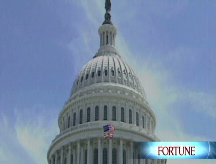Fed official hints at recession
San Francisco Fed President Yellen acknowledges what Bernanke and others generally try to avoid in describing U.S. economy.
 |
| San Francisco Fed President Janet Yellen used the term avoided by Fed officials when she said the U.S. economy appears to be in a recession. |
NEW YORK (CNNMoney.com) -- San Francisco Federal Reserve Bank President Janet Yellen has acknowledged what most economists have said, but few Fed officials would speak before now, using the word "recession" in commenting on the U.S. economy.
"Indeed, the U.S. economy appears to be in a recession," she said in a speech Tuesday night at the Silicon Valley Chapter of Financial Executives International. She added "This is not a controversial view."
Still it is not a word that most Fed officials have been comfortable using in their official pronouncements, even as they warned of severe problems for the U.S. economy that are expected to be caused by the crisis in the nation's financial and credit markets.
A search of all the speeches and testimony given by Fed Chairman Ben Bernanke so far this year found he used the word only twice. In both instances, he referred to past downturns rather than current conditions - even though as early as April he said that a "recession is possible" in response to questions when appearing before the Senate banking committee.
Bernanke and other Fed officials have given a dire outlook for the risks to the economy from the recent credit crisis. Just last month, in testimony in favor of a $700 billion Wall Street bailout then pending before Congress, Bernanke warned that the economy faced "grave threats" and its most serious problems in more than 60 years. But he still avoided using the word recession in his prepared remarks.
Yellen also has only used the term recession when referring to the past in her speeches so far this year. The last time she used the term when speaking of current conditions was back in February when she said "I consider it most probable that the U.S. economy will experience slow growth, and not outright recession, in coming quarters."
The popular view of when a recession occurs is when gross national product, the broad measure of the nation's economic activity, comes in less than zero for two consecutive quarters.
Yellen said she expects third-quarter GDP to show no growth, given the monthly readings that help make up that quarterly report. And she pointed out that the economists surveyed by the Blue Chip Economic Indicators forecast there will be three consecutive quarters of negative GDP readings starting with the third quarter.
But GDP is not the primary reading used by the official arbitrator of whether the U.S. economy is in a recession, the National Bureau of Economic Research. Instead that group of economists, when determining when a recession starts and stops, looks at a variety of readings that measure nationwide economic activity, including the number of people on U.S. payrolls, industrial production, and the inflation-adjusted measures of personal income and the sales of the manufacturing and wholesale-retail sectors.
The NBER generally waits to see the revised readings of the economic measures it watches before it declares the start of a recession. It did not pronounce the March 2001 start of the most recent recession until November that year, eight months after the fact. It later determined that November was the month that recession ended.
Yellen is not currently a voting member of the Federal Open Market Committee, the group of Fed governors and district bank presidents who set interest rates. But she is one of the longer serving bank presidents and very influential among policymakers.
Her comments also focused on the crisis in financial and credit markets as she warned "virtually every major sector of the economy has been hit by the financial shock." She warned that there are "some signs of a slowdown for the previously very strong IT industry across the country," a remark of particular interest given her tech-focused audience.
She defended recent rescue actions taken by the Fed, the Treasury Department and governments around the globe to get credit markets functioning again, and said it gave her reason for optimism, despite the challenges faced by the global economy. But she cautioned a recovery in the near term is by no means certain.
"Although the challenges are daunting, I am encouraged that policymakers around the globe are now responding rapidly and forcefully to resolve the financial crisis," she said at the conclusion of her speech. "The global economic outlook depends on how well these policies succeed." ![]()


